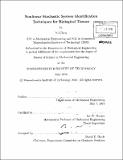Nonlinear stochastic system identification techniques for biological tissues/
Author(s)
Chen, Yi, S.M. Massachusetts Institute of Technology
DownloadFull printable version (39.57Mb)
Other Contributors
Massachusetts Institute of Technology. Dept. of Mechanical Engineering.
Advisor
Ian W. Hunter.
Terms of use
Metadata
Show full item recordAbstract
This research develops a device capable of measuring the nonlinear dynamic mechanical properties of human tissue in vivo. The enabling technology is the use of nonlinear stochastic system identification techniques in conjunction with a high bandwidth actuator to perturb the tissue. The desktop and handheld instruments used for this investigation were custom-built Lorentz force actuators which were able to measure the dynamic compliance between the input force and the output displacement. The actuators have a nominal stroke of 32 mm and were actuated with forces under 15 N. The design includes custom electronics and user software which collects and analyses the information. This research also explores nonlinear stochastic system identification techniques that would be applicable to biological tissues. Several system identification techniques were used including linear, Wiener static nonlinear, Volterra kernel and partitioning techniques. Real time system identification and real time input generation schemes are also implemented. The mathematical formulation and implementation details of these techniques are also discussed. It was found that a simple linear stochastic system identification technique had a variance accounted for (VAF) of 70 to 75 %. More complicated representations using Volterra kernels or partitioning techniques had a VAF of 90 to 97 %. More complex nonlinear system identification techniques can not only capture more of the nonlinear dynamics but also capture those dynamics in an interpretable way. Indentation, extension, and surface mechanics experiments were conducted to investigate the nonlinear mechanical compliance of skin in vivo. The techniques and devices used in this research can be applied directly to consumer product efficacy analysis, medical diagnosis as well as research in biomechanical tissues.
Description
Thesis (S.M.)--Massachusetts Institute of Technology, Dept. of Mechanical Engineering, 2010. Cataloged from PDF version of thesis. Includes bibliographical references (p. 205-212).
Date issued
2010Department
Massachusetts Institute of Technology. Department of Mechanical EngineeringPublisher
Massachusetts Institute of Technology
Keywords
Mechanical Engineering.